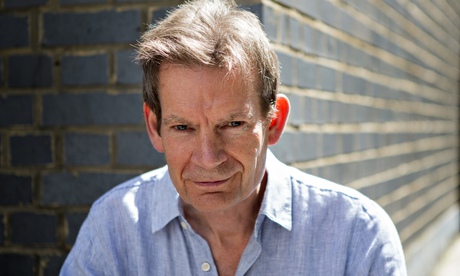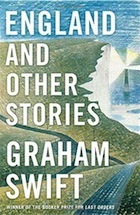The author of Waterland and Last Orders tells Susanna Rustin how 'joyful' he feels to be writing short stories

'I often write about the moments of crisis in people’s life where a space opens up' … Graham Swift. Photograph: Graham Turner for the Guardian
Graham Swift's new collection of short stories – his first for more than 30 years – is called England and Other Stories, and "England" is the name of the last one in the book. In it a coastguard, Ken, driving across Exmoor at 5am, stops to help the driver of a beaten-up BMW stuck in a gully at the side of the road. The stranger turns out to be an African-Caribbean comedian from West Yorkshire, stranded on his way to a booking in Ilfracombe on the north Devon coast, and the story turns on Ken's perception of him.
 Where is he from? Could he be dangerous? Is he lying when he says he swerved to avoid a deer? Is he even real? "In time even Johnny Dewhurst, like that questionable deer, might start to seem like a hallucination," Ken tells himself as he drives off into the dawn, having resolved to tell nobody about the encounter and to decline an invitation to that night's show for fear of becoming part of the routine ("Have you heard the one about the lost coastguard?").
Where is he from? Could he be dangerous? Is he lying when he says he swerved to avoid a deer? Is he even real? "In time even Johnny Dewhurst, like that questionable deer, might start to seem like a hallucination," Ken tells himself as he drives off into the dawn, having resolved to tell nobody about the encounter and to decline an invitation to that night's show for fear of becoming part of the routine ("Have you heard the one about the lost coastguard?").
"It's a totally bizarre story, I went with its bizarreness," says Swift. "I suppose of all the stories in the book it is the most weirdly many-faceted. It brings together so many diverse things in, of all places, Exmoor."
Swift, who is 65, grew up in south Croydon, Greater London, and has lived in the same house in the capital for decades with his wife, whom he met when both were students in York, but whose childhood home was in the adjoining suburb, Thornton Heath. Swift, who came from a modest background and attended the private school Dulwich College on a scholarship, is a south Londoner to his bones. He loves it, and says: "Out of all the big metropolitan cities in the world, London has probably absorbed diversity within itself the best."
More
 Where is he from? Could he be dangerous? Is he lying when he says he swerved to avoid a deer? Is he even real? "In time even Johnny Dewhurst, like that questionable deer, might start to seem like a hallucination," Ken tells himself as he drives off into the dawn, having resolved to tell nobody about the encounter and to decline an invitation to that night's show for fear of becoming part of the routine ("Have you heard the one about the lost coastguard?").
Where is he from? Could he be dangerous? Is he lying when he says he swerved to avoid a deer? Is he even real? "In time even Johnny Dewhurst, like that questionable deer, might start to seem like a hallucination," Ken tells himself as he drives off into the dawn, having resolved to tell nobody about the encounter and to decline an invitation to that night's show for fear of becoming part of the routine ("Have you heard the one about the lost coastguard?")."It's a totally bizarre story, I went with its bizarreness," says Swift. "I suppose of all the stories in the book it is the most weirdly many-faceted. It brings together so many diverse things in, of all places, Exmoor."
Swift, who is 65, grew up in south Croydon, Greater London, and has lived in the same house in the capital for decades with his wife, whom he met when both were students in York, but whose childhood home was in the adjoining suburb, Thornton Heath. Swift, who came from a modest background and attended the private school Dulwich College on a scholarship, is a south Londoner to his bones. He loves it, and says: "Out of all the big metropolitan cities in the world, London has probably absorbed diversity within itself the best."
More
No comments:
Post a Comment